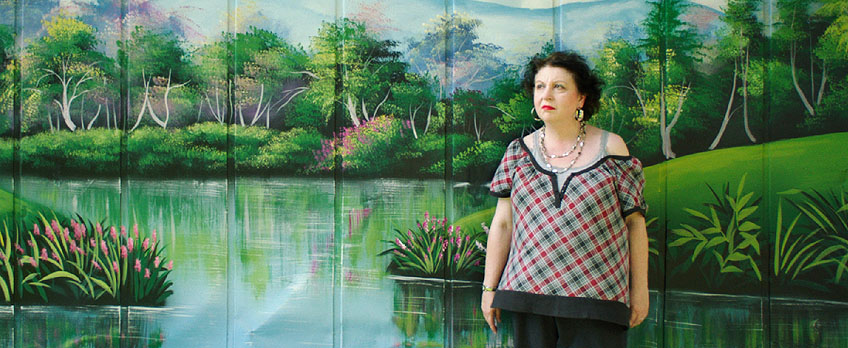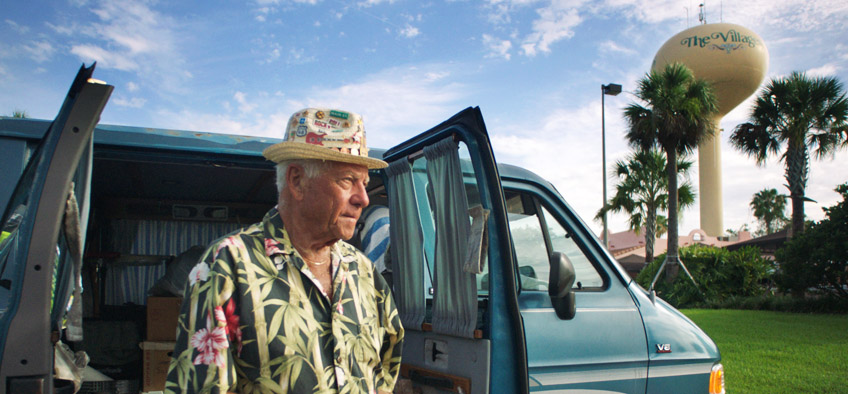Humour and Heartbreak: An Interview with Lance Oppenheim

Lance Oppenheim’s first feature-length documentary, Some Kind of Heaven, is a sun-drenched deep dive into The Villages, a sprawling retirement community in central Florida. The Villages is home to some 130,000 residents hoping to live out their twilight years in style – surrounded by pickleball courts, manicured golf courses and seemingly constant musical performances. Yet it is the stories from the fringes, from people who don’t quite fit in to this postcard-perfect lifestyle, that prove to be the most captivating.
Critics Campus participant Annika Morling speaks to Oppenheim about making a film on retirement while still in college, finding humour within serious topics and seeking out authentic stories in such a manufactured place.
Annika Morling: In the film, one of the women describes moving to The Villages as “like going off to college”. How did you, as a young filmmaker who began making this film while in college, navigate the generational gap between yourself and the subjects in the documentary?
Lance Oppenheim: This was kind of a guiding principle as we were making the movie: I wasn’t there to make a movie about old people; I was there to make a movie about people. We formed strong bonds with the subjects because we were there during extremely sensitive moments in their lives. It became a familial sort of ordeal. It wasn’t like I was their grandson; it was more of a mature relationship where we were sharing hard things that were going on in our lives.
I was in [my last year of] college – this was actually my college thesis originally – and I think that was another aspect of things: being in a world like The Villages where everyone is trying to go back to the time I was leaving. It made me look at the place a little less judgmentally. If I was that age, I would want to do the exact same thing, maybe – I would love to party and dance. I would want to go out with a bang. In a way, being in that place and being around those people helped me make sense of my own existential fears. I don’t like to prescribe a message, but the thing I kept thinking in the movie is, You may grow older, but you may not grow necessarily wiser, and that’s totally fine. You could totally be just as much of a hot mess […] when you’re 83 as you are when you’re 24. That was kind of scary but also relieving in a lot of ways.

Some Kind of Heaven
In Some Kind of Heaven, as in your other documentary work, you really let the subjects speak for themselves – you don’t appear in the films, you don’t add voiceover and you use very few explanatory intertitles. Why do you choose this style of filming and editing?
I like the challenge of trying to keep myself inside the film. There is a point of view; there are choices that are made stylistically that show what I’m thinking and how I’m seeing things. But I don’t necessarily want to prescribe anything or dictate a way of explicitly seeing something. I wasn’t trying to make a Wikipedia, journalistic film: Here’s how the place grew to 130,000 people or Here’s how much the average person who lives here made before they retired. Those kinds of docu-information movies – and there are plenty of good ones out there – I’m less interested in. I would much rather let people escape into a place, give them the feeling that some of the subjects feel. Hopefully, when people in The Villages see the film, they’ll see it as something that speaks to their experiences.
It’s a gorgeous film, with some really stunning, postcard-like shots of The Villages. Did you find it tricky, in terms of tone, to balance these picturesque, stylised images with the more personal struggles being explored?
Totally. Tonally, it’s hard to find something that can make you cry in one moment and laugh in another without, you know, feeling like your emotions are being tugged on too much. I think the one principle I really like in movies, and that I hope is in mine, is when the drama is funny and the comedy is sad. And I think, if you’re able to find a little bit of a balance between those two things, tonally, it becomes really engaging. There’s an ambiguity – you don’t know if something’s supposed to be funny or not. Even Reggie [Kincer, a film subject who is charged with minor drug possession] at court is not funny at all – it’s really horrifying. But when Reggie and [his wife] Anne [Kincer] see the film now, they laugh hysterically at that moment because there is something funny going on in that scene. In my own life, that’s how I also relate to things – when I’m going through really bad stuff, I try to look at the humour in it.
But it definitely took a while to find that balance, because I never wanted to make a movie that was just a postcard version of The Villages. I think the most obvious version of the film would have been an exposé that shows you that not everything is totally right in this utopia. I think Some Kind of Heaven is somewhere in between – you see the world of The Villages and you see a few different experiences that many people could relate to, that could happen anywhere. A specificity that I hope is universal, in a way.